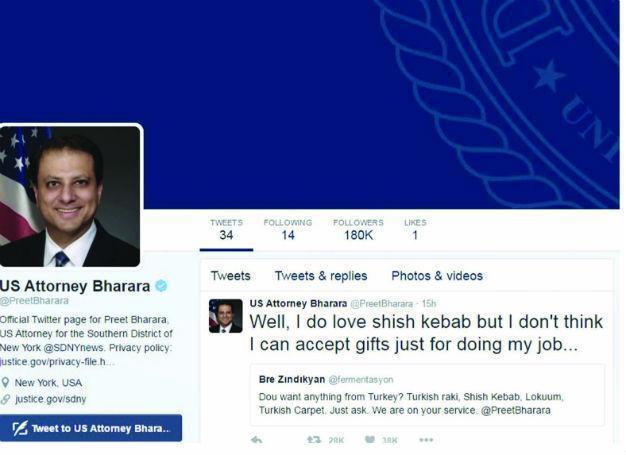Analysis: US prosecutor becomes a phenomenon in Turkey
Güneş Kömürcüler
 Social media has become a crucial platform for many people in Turkey to voice their concerns about what is happening in the country and the neighboring region. In leading social media platforms, U.S. prosecutor Preet Bharara, who has charged Reza Zarrab, an Iranian-born Turkish businessman who was acquitted in a vast Turkish graft probe in 2014 after 70 days in jail, has become a new phenomenon in Turkey.
Social media has become a crucial platform for many people in Turkey to voice their concerns about what is happening in the country and the neighboring region. In leading social media platforms, U.S. prosecutor Preet Bharara, who has charged Reza Zarrab, an Iranian-born Turkish businessman who was acquitted in a vast Turkish graft probe in 2014 after 70 days in jail, has become a new phenomenon in Turkey.
It is quite normal for a country where the freedom of media and the reliability of many other institutions have become more and more questionable to flock to social media platforms. The members of the International Press Institute (IPI) have recently called on Turkey to end an “escalating crackdown on independent media and dissenting voices that has seen the misuse of anti-terrorism laws to target and imprison journalists reporting on public interest issues.”
In this environment, many people have preferred the social media to find information as well as voicing their thoughts about what is going on. It is, of course, of high concern that people are looking for reliable or confirmed information through social media platforms instead of robust media outlets, but the existence of the latter is unfortunately highly questionable in Turkey right now.
Amid continuous terror attacks in Turkey for the last six months, social media platforms have become a field for many people to voice their pessimism about the future. The country’s two biggest cities were hit by terrible suicide attacks in the last months, and these terror attacks have been “just mentioned” by western media outlets. Of course, no one can compare which terror attacks are more brutal than others across the globe, but the small coverage of the attacks in Turkey has definitely fueled Turkish people’s feeling of loneliness.
This pessimism and desperate feelings have dominated social media messages for months.
With the arrest of Zarrab in the U.S., some extraordinarily creative and even tragicomic messages have started to dominate social media platforms again. The number of followers of Bharara on Twitter has jumped from around 5,000 to over 180,000 in the two days following the news of Zarrab’s arrest. Almost all of the new followers of the U.S. prosecutor are from Turkey. Hundreds of tweets were sent to him, praising his work and even offering famous Turkish products. In a tweet, one person tweeted: “Do you want anything from Turkey? Turkish raki, shish kebab, lokuum (Turkish delight), Turkish carpet. Just ask. We are at your service.” Bharara replied to this tweet: “Well, I do love shish kebab but I don’t think I can accept gifts just for doing my job,” on March 22.
The quality, independence and reliability of all institutions matter a lot, as M.I.T. economist Daron Acemoğlu and leading political scientist James A. Robinson explained in their brilliant book, “Why Nations Fail.” In the first chapter of the book, it says: “On one side of the border fence [between the U.S. and Mexico], in Santa Cruz County, Arizona, the median household income is $30,000. A few feet away, it’s $10,000….The key difference is that those on the north side of the border enjoy law and order and dependable government services — they can go about their daily activities and jobs without fear for their life or safety or property rights. On the other side, the inhabitants have institutions that perpetuate crime, graft, and insecurity.”
Without establishing robust and dependable institutions, social welfare and economic development is impossible to maintain for any country across the globe.
















